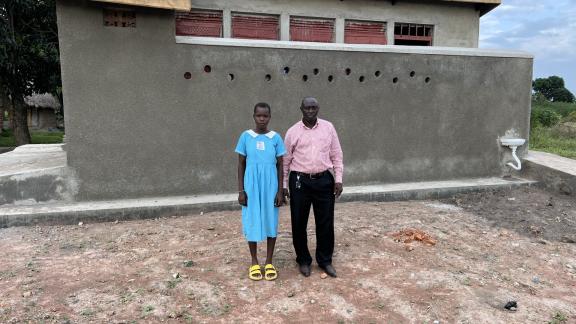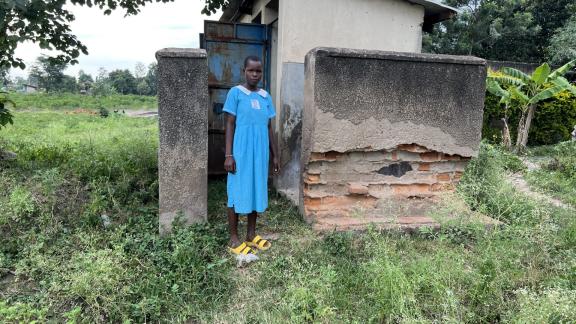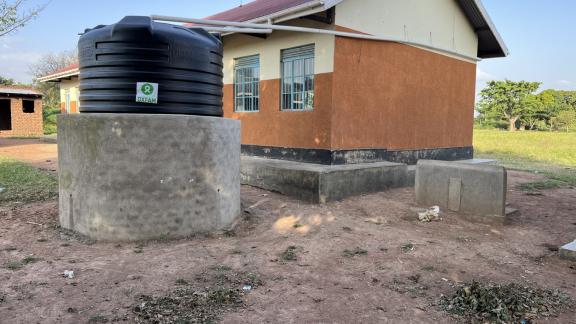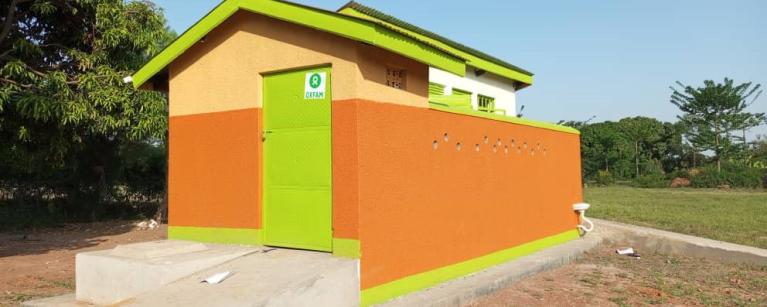Manafa Primary School, located in Mazimasa sub-county, Butaleja, has undergone a significant transformation to address long-standing challenges affecting its pupils and staff.
With a population of 1,397 pupils (703 boys and 694 girls) and 15 staff, the school has been grappling with insufficient sanitation facilities – hindering the learning environment for its pupils.
For instance, a few years ago, out of the seven latrine stances, five had collapsed, leaving the school to depend only two functional stances. This resulted in sharing of stances between girls and boys and caused congestion. This forced some children to resort to open defecation, further worsening hygiene challenges in the school.
“‘This situation has been affecting the learner’s performance as time management was a bit challenging. Maintenance of proper hygiene at the two stances has been extremely challenging because of the huge populations,’ says Naleba Yusufu, the 49-year-old school head teacher, adding that the school is grappling with an overwhelming pupil-to-stance ratio of 701:1.”
Jamira Kataike, a primary five pupil at the same school added the girls did not have privacy since they were sharing latrines with boys.
Recognising the dire situation, Oxfam stepped in, working closely with district stakeholders to assess the school’s needs.
Manafa Primary School was selected by Oxfam and the district stakeholders to receive facilities aimed at improving sanitation and water access. The intervention included the construction of two new blocks of latrines and the installation of a rainwater harvesting tank.
The construction of the two new latrine blocks has thus increased the total number of functional stances from two to 12. The latrine blocks include five stances for girls and five stances for boys, hence improving the pupil-to-stance ratio from 701:1 to 116:1.
And for the first time, the girls latrine included a change room for menstrual hygiene management which allows girls to keep in school.
Yusufu is hopeful that the utilization of the latrine facilities will reduce the congestion in latrines, when the pupils return from holidays, improve proper disposal of human excreta, and contribute to growing enrolment of learners in the school especially girls and provide a conducive environment for the pupils.

Yusufu, Headteacher Manafa Primary School and Jamira, a pupil standing behind the latrine, during its construction at Manafa Primary School.
Yusufu also highlighted that initially girls, especially in the upper classes would be sent home when they started experiencing their menstrual period since the school has no provision for changeroom.
Jamira is optimistic about the girls’ changing room, hoping that the girls who experience menstrual periods will no longer miss classes, adding that it will give the girls privacy.
“Girls in upper primaries normally smear blood on the wall, others are sent home during their menstrual periods cycle since we did not have additional stances or washrooms, and latrines are in most cases dirty which will not be the case with the provision of change room and constant water supply,” Jamira noted.

Kataike Jamira, a pupil at Manafa Primary School showing the nonfunctional 5-stance latrine which was formally used by Girls
Improving water facilities
Oxfam has also installed a 10,000-litre rainwater harvesting tank as a reliable water source to enable school to carry out hygiene activities more effectively such as cleaning the latrines regularly, hand washing, and even improving cooking practices for both students and staff.
The available school’s yard tap is unreliable as the school would sometimes go for more than one week without water. This forced pupils to trek long distances to fetch water, disrupting their class attendance and making hygiene-related activities such as latrine cleaning, handwashing, and cooking difficult.
With the new rain tank, Jamira believes that hand washing practices will improve since there is available water supply and enable girls to keep in school instead of going home to clean themselves.

The photo shows the installed rainwater harvesting tank at Manafa Primary School
Sustainability
For sustainability and safeguarding the facilities, Yusufu added that the school management is planning to fence the entire school to safeguard the facilities from intruders.
He says that the school will also continue sensitising the learners on good usage and management of the facilities provided as well as ensuring there is an operational budget for maintenance of the facilities such as like desludging the latrines when they are filled up, provision of cleaning materials such as like brushes and detergents to support the pupils during cleaning.
The construction of two latrine blocks and a rainwater harvesting tank will improve hygiene and waste disposal at Manafa Primary School, hence prevent disease, reduce pollution, and enhance pupil retention and performance.
While the intervention has significantly improved conditions, some challenges remain. Yusufu adds that the school still needs additional latrines for staff, handwashing facilities, cleaning materials, waste management bins, and a fence to safeguard the new facilities. There is also a pressing need for more classrooms and staff quarters to accommodate the growing population.
With funding from OXFAM-Global Humanitarian Team (GHT) under the CAT FUND, Oxfam is implementing integrated WASH and Protection Response to vulnerable disaster affected communities in Butaleja district in Mt Elgon region, Uganda, which seeks to address Water Supply, Sanitation and Hygiene promotion (WASH) needs in the affected communities.
By James Ambayo Okudi - Public Health Engineering Team Leader, Mt Elgon Region and Sarah Mazirwe - Communications Assistant| Oxfam in Uganda
